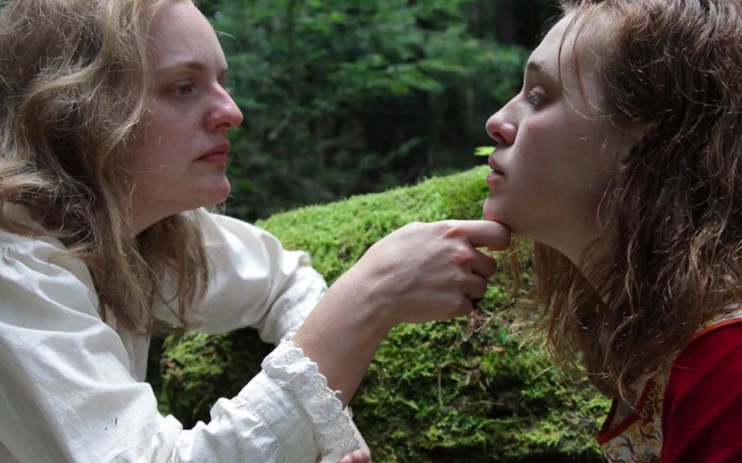Shirley film review: Elizabeth Moss chills again in strange horror

Having chilled us earlier this year with breakout hit The Invisible Man, Elisabeth Moss plays American horror author Shirley Jackson in an interesting non-biopic.
Odessa Young and Logan Lerman play Rose and Fred, a young couple expecting a baby who come to live with Jackson and her husband Stanley Hyman (Michael Stuhlbarg), an academic and Fred’s new boss. As their stay goes on for longer than expected, Rose is asked to do jobs around the house while Shirley works on her new story, a follow up to her wildly successful work The Lottery.
Initially cold toward her, Shirley forms a connection with Rose and draws her into her fascination with the recent disappearance of a young woman. However, the writer’s mind games begin to make Rose question everything around her.
While all the elements suggest this is a biopic, this is far from the story of Jackson’s life. It’s a fictional story featuring real people, told in the unsettling style of one of the author’s stories. Moss plays Jackson as the worst kind of intellectual bully, belittling Rose with remarks about her marriage before drawing her in when she finds some creative use for her.
Young’s character is also coaxed into becoming a de facto housekeeper for Jackson and Hyman, given the former’s bouts of agoraphobia and reluctance to leave bed. Reasons are given for her behaviour, particularly the manipulation of Hyman, but there’s little debate that this isn’t a flattering portrait.
Fans of the author will point out that this is also very far from accurate. A hard-working mother of four (she is childless in the story), the real Jackson shared the film version’s alcoholism and the mental strain of Hyman’s infidelity. However, she seemed to be nowhere near the vindictive puppet master we find in Decker’s film.
So, the portrayal may be inaccurate, but it’s hardly the first film do play fast and loose with the truth. The Greatest Showman, Shakespeare In Love, and The Social Network all wrap real life figures around completely fictionalised plots.
What makes Shirley so interesting is that it feels like a story Jackson might tell, and in that sense is remarkably faithful to her writing legacy. Mixing disorientating camera angles with a creepy soundtrack, there’s a sense of unease that grows as we observe the four leads unravel.
Young is complex and intriguing as the audience’s point of view, an expectant mother whose quiet discontent is recognised by Jackson (“let’s pray for a boy” Moss proposes, “the world is far too cruel to girls”). While her castmates have far more showy roles to dig into, the Australian actor develops in more subtle ways. Logan Lerman is the picture of 50s male privilege, feeling entitled to advancement at his job, which Hyman gleefully denies him.
One of the most underrated character actors around, Stuhlbarg initially seems like a more jovial version of his role in Call Me By Your Name, welcoming Fred and Rose into their home and papering over the cracks caused by his wife’s terse nature. As the film goes on, it’s revealed he is the tormenter, an egotistical philanderer prodding at Jackson to produce more content and imposing himself on his young house guests for his own ends. He may be the life of the party, but we’re left in no doubt as to where much of Shirley’s trauma stems from.
Of course, all of performances orbit around Moss’ central character. Ever the powerful lead, as Jackson she is far from likeable, but as things progress, we begin to understand where this behaviour comes from. Bedevilled by drink, mental health issues, and the restriction imposed on women at the time, she commands your attention every moment she appears on screen.
Shirley’s unconventional nature may be too much for the casual viewer, as it refuses to be put in any kind of clean category. However, an unsettling tone and marvellous acting ensure it is far more memorable than a hundred by-the-numbers biopics.
Shirley is available On Demand.